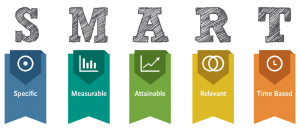Before you get started on a weight loss program, consider the following tips. They should help you reach the goal of obtaining and maintaining a healthy weight.
 Set the Right Weight Loss Goals
Set the Right Weight Loss Goals
Setting effective weight loss goals is an important first step. Most people trying to lose weight focus on just that one goal: weight loss. However, the most productive areas to focus on are the dietary and exercise changes that will lead to long-term weight control. Successful weight managers are those who select two or three goals at a time that they are willing to take on.
Keep in mind that effective weight loss goals are specific, attainable, and forgiving.
For example, “exercise more” is a wonderful goal, but it’s not specific. “Walk five miles everyday” is specific and measurable, but is it attainable if you’re just starting out? “Walk 30 minutes every day” is more attainable, but what happens if you’re held up at work one day and there’s a thunderstorm during your walking time another day? “Walk 30 minutes, five days each week” is specific, attainable, and forgiving.
 Reward Weight Loss Success (But Not With Food!)
Reward Weight Loss Success (But Not With Food!)
Rewards that you can control can be used to encourage you to attain weight loss goals, especially those that have been difficult to reach.
An effective reward is something that is desirable, timely, and contingent on meeting your goal. Rewards may include treating yourself to a movie or massage, taking an afternoon off from work, or just an hour of time to yourself. Keep in mind that numerous small rewards, delivered for meeting smaller goals, are more effective than bigger rewards, requiring a long, difficult effort.
 Balance Your (Food) Bank Account
Balance Your (Food) Bank Account
Balancing a limited amount of calories daily is a little bit like balancing your financial resources. Without keeping a close tabs of your spending it is easy to lose track of your remaining balance. Spend too much and you overdraw your account. And then you have to pay those hefty overdraft fees.
Without recording your spending, have you ever looked at your bank account and wondered where did all my money go?
In the same way this means that you should monitor your lifestyle by observing and recording some aspect of your eating and exercising behaviors, such as how many calories you eat in a day, how many servings of fruits and vegetables you eat per day, or how often and for how long you exercise. There are many computer and cell phone apps designed to help you track lifestyle factors like calorie intake. Doing this can really help you determine how you are doing and what you need to do to meet your weight loss goals.
 Avoid Eating and Food Triggers
Avoid Eating and Food Triggers
Identify those social and environmental cues that tend to encourage undesired eating, and then work to change those cues. For example, you may learn that you’re more likely to overeat while watching television, or whenever treats are on display by the office coffee pot.
Then work to sever the association of eating with the cue (don’t eat while watching television), avoid or eliminate the cue (leave coffee room immediately after pouring coffee). In general, visible and accessible food items are often cues for unplanned eating.
 Get the (Fullness) Message
Get the (Fullness) Message
Changing the way you go about eating can make it easier to eat less and lose weight without feeling deprived. It takes 15 or more minutes for your brain to get the message you’ve been fed. The message your body sends you is very subtle. It takes practicing mindful eating to recognize approaching fullness. This means you need to slow down the speed that you eat. That will allow satiety (fullness) signals to begin to develop by the end of the meal. Periodically stop when eating to check for approaching fullness. You may not need to go further, regardless if you still have food on your plate.
Eating lots of vegetables or high fiber fruit can also make you feel fuller. Another trick is to use smaller plates so that moderate portions do not appear smaller. In addition, changing your eating schedule, or setting one, can help you reach your goal, especially if you tend to skip, or delay, meals and overeat later.


